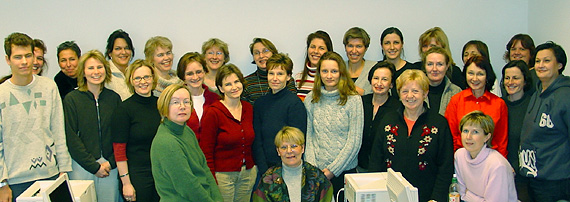The Assistants in Clinical Research and Quality Control of the Competence Network during the seventh meeting in Berlin on 2/20/2002.
Assistants in Clinical Research and Quality Control (ACRQC)
Author: Dr. med. Ralf Herold, Editor: Julia Dobke, Last modification: 2021/10/08
Table of contents
Assistants in Clinical Research and Quality Control (ACRQC) are active in 27 centers and departments for pediatric oncology across Germany and play an important role for the work of the Competence Network. The following page will give you more information. Assistants in Clinical Research and Quality Control are appointed, supervised, trained, informed and evaluated by the Coordination and Management Group. Some of the documents and plans created in this context are available for download.

Parts of the ACRQC's field of work are identical to that of 'Clinical Research Assistants', 'Data Monitors', 'Research/Study Nurses', and 'Medical Documentation Assistants'. In pediatric oncology and hematology is characterized nearly all patients are regarded as study patients. Therapy optimization trials in this field are no exclusive studies of e.g. a single drug, but involve the development of complex therapy guidelines.
Overview
ACRQC improve on-time production, the exchange, the volume and the possibilities of verification of patient related data necessary for diagnosis and treatment. The ACRQC, and the numerous staff members that have been assisting the documentation and material/data logistics for years, do the spadework necessary for further improvements of the situation of children and adolescents with cancer.
Innovative Areas
Each Assistant in Clinical Research and Quality Control is assigned to one pediatric hospital in which he supports all the house's trials. To support the ACRQS with their work a special training and information program has been developed, that leads to the award of a certificate after passing an exam and having proven a sufficient amount of experience. Numerous training programs and certifications have recently been introduced. Management and control of the assignments are centralized. The ACRQS will introduce a standardized procedure of electronic data processing on a wide-area basis. Medical documentation will be done by use of the DOSPO system.
Demand of Clinical Trial Centers
ACRQR are highly focused on practical aspects of trial realization in the participating instituations. In case of questions, trial coordination centers can contact all ACRQC via the Coordination and Management Group.
Demand of Hospitals
ACRQC are active in 27 pediatric oncologic centers or departments and reach approx. 70% of all patients with a first incidence of cancer. The hospitals presume that documentation procedures account for approx. 70% (reference value) of the ACRQC's working hours. Support is also needed for material dispatching and logistics regarding the realization of study protocols.
Initial Situation
During the first training and information meeting, new employees were interviewed to collect a set of basic data about their skills and previous knowledge and the present work situation. Twelve ACRQC are former child nurses twelve of which had been working in pediatric oncology wards; another two are (adult) nurses. One ACRQC had been working as an assistant medical technician, one as a dentist's assistant; one was with a counseling service for cancer patients. Two employees are medical doctors, on is a physicist. Eight are certified documentation officers (9/18/2000).
Survey of Experience from 06/14/2000: 4 ACRQC knew the term "GCP" from clinical research. Only 3 ACRQC did not know the job profile published in the letter from 12/16/1999. 'Tissue set' and 'bio case' are known terms to 5 ACRQC. By June 2000 only 8 ACRQC could already name a contact person. 2 ACRQC have an own, 11 share an office. Two shift between different offices. The work place of 5 ACRQC is equipped with a computer while 14 report to have an own email address. 16 ACRQC have basic, 8 advanced computer skills. A hospital information system is used by 10 of all ACRQC, 6 use CATIPO, 13 know DOSPO of which 3 have already used with it. This information was forwarded to the heads of department by letter on 07/10/2000.
